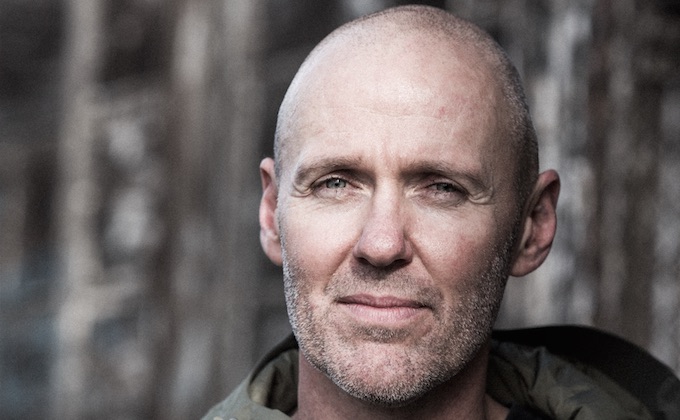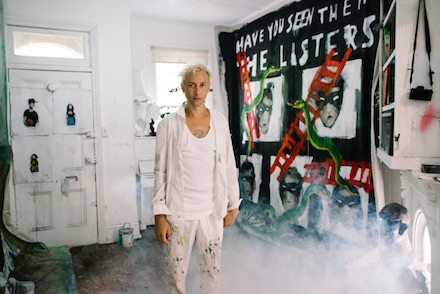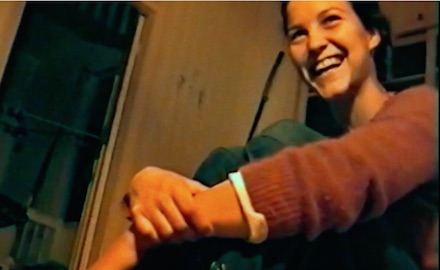HAVE YOU SEEN THE LISTERS?: THE EDDIE MARTIN INTERVIEW
 Monday, January 22, 2018 at 7:06AM
Monday, January 22, 2018 at 7:06AM IFFR 2018: Compiled from a lifetime of footage courtesy of the subject himself, the immense task of collating the images into a coherent whole ensures Have You Seen The Listers? is a groundbreaking feat for director Eddie Martin. That the life story of Anthony Lister should also prove such a profoundly personal insight into both the creative process and turbulent family life of the internationally acclaimed Australian artist is a remarkable cinematic achievement. “Individuals that push themselves and challenge the status quo inspire me,” says Martin, who has celebrated the outsider’s spirit in his films Jisoe (2005), Lionel (2008) and All This Mayhem (2014). The director spoke with SCREEN-SPACE ahead of his latest film’s international premiere at the prestigious International Film Festival Rotterdam…

SCREEN-SPACE: When the footage became available to you, did you search for content that served a specific vision you had of Anthony’s life? Or were the twelve terabytes a kind of ‘co-storyteller’, guiding and influencing your own creativity?
MARTIN: There’s no question the available archive material will dictate elements during the making of a documentary film. However to begin the process of making this particular film, first and foremost it was about spending time with Anthony, getting to know him, his story and world. It was later when he presented me with his personal archives, I was able to evaluate the material in relation to the narrative and draw a greater sense of what l could utilise. Once I had a handle on all the elements, I was able to activate my vision for the film.
SCREEN-SPACE: Did Anthony give you free rein to tell his story through your eyes, or were there moments when he was ‘over your shoulder’ during the editing?
 MARTIN: Being artistic by nature, Anthony (pictured, right) was incredibly trusting with the process and gave me the space to work independently, which I greatly appreciated. With that said I did show him an edit. I have a great deal of respect for my documentary subjects. You have to be incredibly brave to share your life with the world and it’s a responsibility I don’t take lightly. I didn’t want there to be any nasty surprises and I also wanted to ensure he was okay with everything we were putting out there. There are some incredibly personal and confrontational scenes. We talked through any concerns, there were a few things we had to look into due to legal reasons, but apart from that he was happy to share his story with audiences. Anthony is a unique, highly creative individual and I’m genuinely honoured for the trust he’s given me.
MARTIN: Being artistic by nature, Anthony (pictured, right) was incredibly trusting with the process and gave me the space to work independently, which I greatly appreciated. With that said I did show him an edit. I have a great deal of respect for my documentary subjects. You have to be incredibly brave to share your life with the world and it’s a responsibility I don’t take lightly. I didn’t want there to be any nasty surprises and I also wanted to ensure he was okay with everything we were putting out there. There are some incredibly personal and confrontational scenes. We talked through any concerns, there were a few things we had to look into due to legal reasons, but apart from that he was happy to share his story with audiences. Anthony is a unique, highly creative individual and I’m genuinely honoured for the trust he’s given me.
SCREEN-SPACE: What was the human trait, the essence of Anthony as both a man and an artist, that you felt had to be conveyed?
MARTIN: Anthony’s a really passionate character. While he makes mistakes along the way his battle to make art accessible and understood is a honourable one. Prioritising the passion he has for his work over family isn’t uncommon. Repeating the behavioural patterns of our parents is also universal. He has the confidence to express himself and the self-awareness to be honest about his mistakes. I think this is something to be valued.
 SCREEN-SPACE: I’m interested in Anika’s involvement with the production. She seemed open and willing to discuss their time while together on-camera, yet all but disappears from the film after they separate. Was that your call or hers?
SCREEN-SPACE: I’m interested in Anika’s involvement with the production. She seemed open and willing to discuss their time while together on-camera, yet all but disappears from the film after they separate. Was that your call or hers?
MARTIN: It was both. Firstly Anthony’s story is told in a linear fashion, once separated Anika (pictured, left) was no longer present in Anthony’s world. So it didn’t make sense for her to provide commentary. The interview she gave was what she was comfortable with. Anika is an artist in her own right. She was incredibly open in revisiting, an at times, difficult past. For me it was extremely important to hear her side of the story, we were very fortunate to have her involvement and I think it’s a side of the story we don’t hear often enough.
SCREEN-SPACE: The subjects of your films have been immensely talented individuals, rising from tough beginnings and overcoming social stigma and personal demons, to face the world on their own terms. What draws you to these types of enigmatic personalities?
MARTIN: I’m drawn to anti-heroes on the fringes of society, especially in today’s mainstream where corporate interests stifle personality. I think it’s important to hear stories from these alternative voices that present different ways of viewing the world while also sharing lessons learnt.
SCREEN-SPACE: From chronicling the life of one street artist in Jisoe twelve years ago, to revisiting the street artist’s existence in …Listers, how have you noticeably developed as an artist/filmmaker/storyteller?
MARTIN: Jisoe was my first film and therefore a purely instinctual process. I had no budget, but I did have a camera and a computer to edit on. It was all I needed to get excited and motivated to try making a documentary film. Now twelve years later, I still rely on my instincts. But what’s changed put simply is a developed understanding of story and structure. I’m grateful to have the support to work with budgets and more importantly a team. Filmmaking is a team sport and for good reason. I have worked with some amazing people and learnt a great deal from all of them along the way. I’m still learning with every film and that’s part of the experience I value the most.
HAVE YOU SEEN THE LISTERS? will screen at the Inetrnational Film Festival Rotterdam from January 29. Ticket and venue information can be found at the IFFR official website.
 Anthony Lister,
Anthony Lister,  Documentary,
Documentary,  Eddie Martin,
Eddie Martin,  FFilm Festival,
FFilm Festival,  IFFR
IFFR 